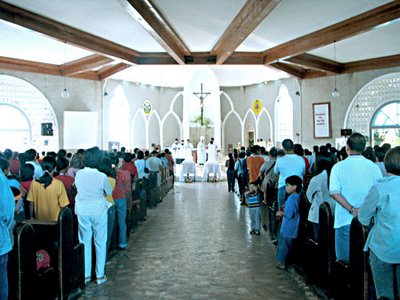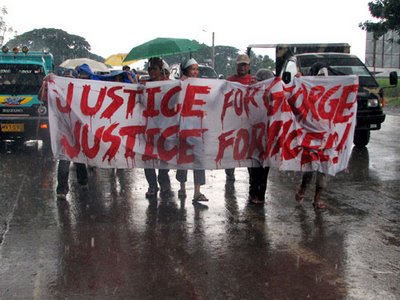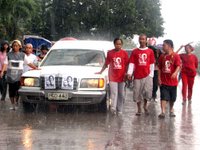Meanwhile: Burying two friends on Mindanao
 Orlando de Guzman
Orlando de GuzmanInternational Herald Tribune
Published: July 20, 2006
COTABATO, the Philippines
As a Filipino who grew up on the northern island of Luzon, Mindanao, in the south, has always had a magical allure - the myth of the Promised Land, blessed and cursed and claimed by a volatile mix of Christian cults, Moro rebels and tribal groups.
In spite of its dangers, Mindanao has beckoned me back many times. I preferred to see beyond Mindanao's faults and focus on the amazing people it produced, many who've become good friends.
Last month Mindanao called me back once again. This time it was to bury two journalist friends who were gunned down in broad daylight in Cotabato province.
George and Maricel Vigo were the kind of journalists I always aspired to become but knew I never had the guts.
When I first met them in 2001, they were struggling to publish their weekly tabloid, called the Headliner. They reported fearlessly on police corruption and abuse of power. They were just recovering from an arson attack at their office - Cotabato's version of a letter to the editor. The fire destroyed everything, but they were determined to start over again.
Back then I was writing about the insidious growth of right-wing militias in Mindanao. They have been around since the early 1970s, when President Ferdinand Marcos used them to fight the growing Muslim insurgency. Then, in the 1980s, they were unleashed to deal with the Communist rebels, the New People's Army. These vigilantes did not hold back when they slaughtered human rights workers, priests, farmers and journalists.
On June 17, President Gloria Macapagal Arroyo announced a new military campaign against the NPA. She instructed her generals to "bring home the bacon" - a choice of words that can have macabre interpretations among vigilante groups.
George and Maricel are not the only journalists and activists to fall this year. They are victims of a growing lawlessness that prevails when you declare open season on an amorphous enemy.
In 2001, I spent a drunken evening at a karaoke bar with one of the militia's self-confessed backers, Joselito Piñol, in a violent town called Mlang. I recall arriving at the pub with Joselito's entourage of men bristling with shotguns, automatic weapons and grenades.
The next day, Piñol, the vice mayor of the town, showed me a factory where they manufactured a whole assortment of illegal weapons, including a machine gun with an obscenely long clip. He fired it off, and smiling, said, "This is for the use of the Ilaga," referring to a local vigilante group that made its reputation in the 1980s chopping up its victims.
I remember interviewing an Ilaga member who coolly related how he cut ears off his Communist prisoners. Bring home the bacon.
The brutality of local politics in Mindanao made the courage of journalists like George and Maricel all the more remarkable. I took comfort in the idea that somehow they were invincible.
They were gunned down on June 19 while driving home on their motorcycle to their five children. Their assailants followed them on two motorcycles, and the killer, riding pillion, fired on them point blank.
Two days after the killings, the police declared they had "70 percent of the case solved." The couple were Communists, the national chief of the police concluded, and their killer was also a Communist whom the NPA sent to kill them for spying for the military.
The police then had Maricel's mother sign what they called a "routine affidavit." She was in fact giving her approval to go ahead with a lawsuit against the NPA. The document was in English, a language she neither reads nor speaks.
Weeks before his death, George told friends that he was being followed by military intelligence. George also told friends that he was on a military blacklist. He had mentioned that his troubles began after he showed local officials a propaganda video mailed to him by NPA.
So far, it seems, the police seem more concerned with smearing the Vigos as Communists than finding the real murderer - who, as other campaigning journalists and activists in Mindanao are painfully aware, is still at large, along with whoever hired him.
Orlando de Guzman is an Indonesia-based radio journalist working for the BBC and Public Radio International.
Read the article in IHT




